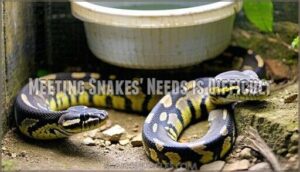This site is supported by our readers. We may earn a commission, at no cost to you, if you purchase through links.

These snakes aren’t just tricky to care for—they can grow huge, escape easily, and pose serious risks to you and others.
Meeting their needs is like juggling flaming swords, and feeding them often involves live prey, which isn’t for the faint-hearted.
Disease transmission is another headache, and honestly, snakes deserve more than cramped cages.
If you’re itching for a scaly companion, there’s more to keep in mind—some facts might just change your mind about pet snakes, and it’s about considering their complete concepts, the serious risks, and the fact that they can be quite tricky to care for, which may lead to a different decision regarding pet snakes.
Table Of Contents
- Key Takeaways
- The Pet Trade is Abysmal
- Captivity Deprives Snakes
- Snakes Aren’t “Starter Pets
- Meeting Snakes’ Needs is Difficult
- Feeding Promotes Cruelty
- Owning a Snake is Irresponsible
- Snakes Can Transmit Diseases
- Snakes Have Feelings Too
- Snakes Have Rights
- Think Twice Before Purchasing
- Frequently Asked Questions (FAQs)
- What are the most common reasons people give for wanting to own a snake?
- What are the benefits of owning a snake?
- What are the risks of owning a snake?
- How can I find a reputable snake breeder or seller?
- How can I make sure my snake is properly cared for?
- How do escaped snakes impact local wildlife populations?
- What legal restrictions exist for owning large snakes?
- Can pet snakes cause allergic reactions in humans?
- How do snake escapes affect neighborhood safety?
- What emergency steps should you take after a snake bite?
- Conclusion
Key Takeaways
- You’ll face serious health risks – Snakes can transmit dangerous diseases like salmonella, botulism, and parasites that cause blood poisoning, gut infections, and liver damage
- Meeting their complex needs is nearly impossible – You’ll struggle with precise temperature control, humidity levels, large enclosure requirements, and specialized diets that most owners cannot properly maintain
- They’re not suitable companions – Snakes do not bond with humans, prefer being left alone, and carry real bite risks, especially dangerous species that can cause serious harm
- You’re contributing to animal suffering – The pet trade forces snakes into cramped conditions that strip away natural behaviors like burrowing and climbing, causing chronic stress and early death
The Pet Trade is Abysmal
Even if you think you’re ready for the coolest pet on the block, the pet trade’s reality is a rude awakening.
Snakes aren’t gadgets or knickknacks—they’re living beings that deserve more than the “product treatment” they get at most shops.
Snakes deserve respect, not a spot on a store shelf or a quick impulse buy.
When sellers push impulse buys or hand over snakes as gifts, they ignore the risk of welfare neglect and the fact that most people aren’t prepared to meet their real needs.
The worst pet snakes get crammed into glass boxes—so-called tanks—that can’t offer the space or comforts of their wild home.
Without proper conditions, many snakes face early deaths, making the whole process seem cruel and pointless.
So, before you think about owning one, remember that the pet trade’s biggest export is disappointment—for both people and the animals trapped by irresponsible ownership and inadequate environments.
Many snakes also suffer from restricted natural behaviors, such as the inability to burrow or climb, which is a clear sign of the irresponsible ownership that plagues the pet trade.
Captivity Deprives Snakes
Many folks don’t realize how much captivity can zap the joy right out of a snake’s life.
Captivity strips away a snake’s natural spark, leaving behind stress and lost vitality.
The worst pet snakes quickly show signs of stress when their natural behaviors get blocked.
Glass tanks may look neat, but they strip away everything snakes need to thrive.
Think about it—no sun for basking, nowhere to dig, no water for a quick swim.
In snake captivity, you’ll notice:
- Increased stress levels
- Loss of healthy appetite
- Ethical concerns about meeting their environmental needs
Snakes deserve better.
Recognizing early stress symptoms can prevent severe health issues and support a snake’s natural behaviors.
Snakes Aren’t “Starter Pets
Not all snakes are created equal in terms of being pets.
The truth is, snakes aren’t “starter pets.”
Each one comes with its own set of snake temperament issues.
They don’t bond with you or crave a good scratch behind the ears—instead, they’d rather be left alone.
Snake bite risk is real, especially with dangerous pet snakes that can pack a punch you’re not ready for.
Impulse buys often lead to unmet needs and quick regrets, since difficult snake care isn’t just about tossing a mouse in a tank.
Long commitment is required for any snake, and ethical concerns around snake mills and poor conditions run deep.
These animals often suffer from inadequate captive environments, further diminishing their quality of life.
If you crave control and safety, here’s a quick table to keep it simple:
| Big Commitments | Hidden Risks |
|---|---|
| Long Lifespan | Handling Dangers |
| Expensive Setup | Snake Bite Risk |
| Unmet Needs | Ethical Concerns |
Meeting Snakes’ Needs is Difficult
It’s tough to meet all the needs of high-maintenance snakes, no matter how prepared you feel.
You’ll wrestle with enclosure size, tricky dietary needs, and environmental control—think daily misting, precise heating, and regular vet visits.
Most snakes aren’t keen on being handled, so behavioral deprivation and snake temperament issues crop up fast.
Health challenges stack up, and snake health issues often go unnoticed until it’s too late.
Environmental stressors can also substantially impact their well-being.
- Large enclosures required
- Strict temperature and humidity control
- Frequent health monitoring
Environmental stressors can also be found in more detail through this link.
Feeding Promotes Cruelty
When dealing with snake feeding, you’ll notice live prey cruelty is a big concern.
Watching a snake constrict a squealing rat isn’t for the faint-hearted, and force-feeding ethics come into play when picky eaters refuse frozen prey.
Snake constrictors need specific dietary needs, but feeding live animals risks injury and stress for both snake and prey.
Ethical implications are clear: repeated exposure to animal suffering isn’t good for anyone.
Obesity concerns also pop up if you overfeed, so balance is key.
Live prey can also offer higher nutrient density, which is something to ponder.
Owning a Snake is Irresponsible
Bringing home a snake might sound exciting, but it’s a recipe for unmet needs and ethical concerns.
These solitary creatures aren’t looking for friendship—they’re snake unsuitable pets, often impulse buys that end in regret.
Their complex care means snake welfare suffers, and with snake dangerous pets, there’s a high risk of harm—even stories of snake killing owners aren’t unheard of.
Temperature gradients are essential for their well-being.
If you want a pet that’s safe and happy, snakes are truly unfavorable pets.
Snakes Can Transmit Diseases
If you think handling a snake is all about cool scales and feeding time, think again—there’s a hidden health risk.
Snakes and their prey can pass on nasty zoonotic diseases, including Salmonella Risk and Parasite Transmission.
Here are four you don’t want to meet:
- Salmonella: Causes blood poisoning and gut issues.
- Botulism: Can lead to paralysis or death.
- Campylobacteriosis: Triggers painful bowel infections.
- Leptospirosis: Damages your liver.
Bacterial infections and snake parasites are no joke. Good hygiene practices are essential, but even then, snake diseases can sneak through.
Snake skin can also transmit diseases, so safe disposal matters.
Snakes Have Feelings Too
When you look past the scales, snakes are more than just instinct—they’re sentient beings with real emotional complexity.
Snake Sentience means they feel fear, stress, and even curiosity, so ignoring their snake behavior and temperament leads to snake aggression and poor snake health.
Captivity Stress isn’t just a buzzword; it’s a daily reality for these creatures.
Proper enclosure setup can substantially impact snake stress levels.
Here’s a quick look at how emotions affect snakes:
| Emotion | Behavior Change | Health Impact |
|---|---|---|
| Fear | Hiding, aggression | Immune decline |
| Stress | Refusal to eat | Weight loss |
| Curiosity | Exploration | Healthy activity |
This understanding is crucial for maintaining the health and well-being of snakes in captivity, and recognizing that they are not just instinctual creatures, but have complex emotional needs.
Snakes Have Rights
If you care about Snake sentience and ethical treatment, remember that your feelings don’t outweigh a snake’s right to freedom.
Snakes aren’t just decorations—they’re sentient individuals with inherent value and a vital ecosystem role.
Captivity concerns and freedom deprivation matter. Here are four reasons to respect snake rights:
- Snakes feel pain and have an emotional range.
- They show complex cognitive abilities.
- Each snake has a unique personality.
- Their presence supports ecological balance.
They primarily recognize owners through familiar olfactory cues.
Ethical considerations mean letting snakes live as nature intended, respecting their right to freedom and acknowledging their importance in maintaining ecological balance.
Think Twice Before Purchasing
Impulse purchases and misinformed choices often lead to unrealistic expectations regarding owning snakes.
These high-maintenance reptiles demand a long-term commitment, ethical sourcing, and careful research. Aggressive snake breeds, difficult snake care, and snake handling problems can quickly turn your dream pet into a nightmare.
One key consideration is ball python ethical sourcing, to guarantee responsible breeding.
Here’s a quick guide:
| Snakes to Avoid | Problems |
|---|---|
| Rock Python | Aggression |
| Green Anaconda | Size, Care |
Frequently Asked Questions (FAQs)
What are the most common reasons people give for wanting to own a snake?
Picture a sleek snake gliding through its terrarium—many people want snakes for their unique appearance, low noise, and fascinating behaviors.
You might crave an easy-to-feed pet, enjoy exotic animals, or seek something different from the usual furry companions.
What are the benefits of owning a snake?
Snake ownership offers unique rewards you won’t find with traditional pets. You’ll enjoy low-maintenance care routines, fascinating behaviors, and quiet companionship that fits busy lifestyles perfectly.
What are the risks of owning a snake?
While snakes make fascinating pets, you’ll face serious risks including aggressive bites, disease transmission like salmonella, expensive specialized care.
Potential escapes, and ethical concerns about confining wild animals in inadequate environments are also significant considerations, including the risk of aggressive bites.
How can I find a reputable snake breeder or seller?
Research breeders online, check reviews and references, visit facilities in person, ask about health guarantees, verify proper licensing, and make certain they provide detailed care information and ongoing support.
How can I make sure my snake is properly cared for?
You’ll want to establish proper habitat conditions with correct temperatures, humidity, and lighting. Choose appropriate prey size, maintain feeding schedules, and monitor your snake’s health regularly through veterinary checkups.
How do escaped snakes impact local wildlife populations?
Picture predators without natural enemies systematically devouring defenseless prey.
Escaped snakes compete with native wildlife for food, causing severe mammal population declines.
They threaten ecosystems by preying on native birds, mammals, and reptiles.
These pythons contribute to mammal population declines within the Everglades National Park.
What legal restrictions exist for owning large snakes?
You’ll face municipal laws and permits that vary dramatically by location.
Some cities restrict both venomous and constricting snakes, while state laws might require permits for snakes longer than 10-12 feet.
Check both levels before buying.
In many states, a permit is required to own venomous snakes, so research venomous snake ownership before acquiring one.
Can pet snakes cause allergic reactions in humans?
Yes, you can develop allergic reactions to pet snakes.
You’re most likely reacting to proteins in their saliva, shed skin, or dander rather than the snake itself, causing symptoms like sneezing, itching, or respiratory issues.
How do snake escapes affect neighborhood safety?
A 14-foot python loose in Indiana for a week demonstrates how escaped snakes become community nightmares.
You’ll face emergency alerts, school closures, and panicked neighbors when your large constrictor breaks free, creating genuine public safety risks.
What emergency steps should you take after a snake bite?
Stay calm and call 911 immediately. Don’t chase the snake or apply tourniquets. Remove jewelry before swelling starts. Keep the bite below heart level and mark swelling progression with a pen.
Conclusion
Statistics show that nearly 4.5 million American households own reptiles, yet most owners don’t realize the challenges involved.
Understanding the worst pet snakes and why you should avoid them isn’t about being anti-snake—it’s about making informed decisions.
These animals require specialized care, pose health risks, and often suffer in captivity.
You’re better off appreciating snakes from a distance rather than confining them to your home, and choose pets that truly thrive in domestic settings instead.













